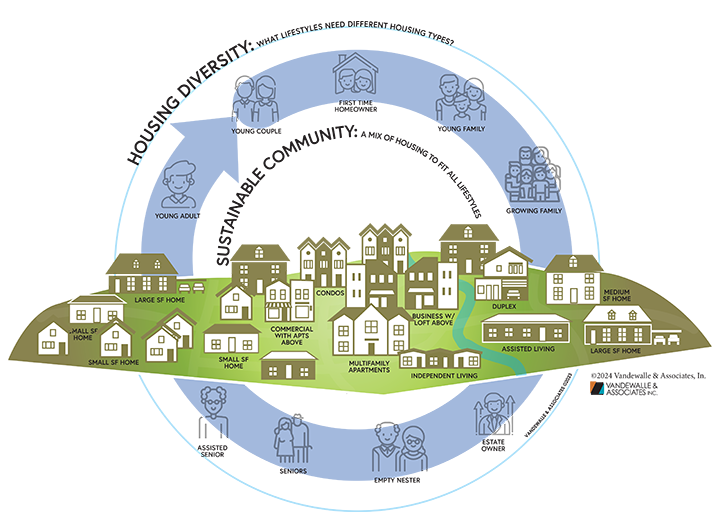success story
Solving Jefferson County’s housing gap
ThriveED revolving loans aim to solve Jefferson County’s housing gap
When Kikkoman, Palermo’s Pizza, Nestle Purina, and Aztalan Bio launched expansions of their operations in Jefferson County in the past year, local authorities cheered at the boosts to the economy and the new jobs that would result—more than 400 in all. “These are high-quality jobs with great employers,” says Deb Reinbold, president of Thrive Economic Development (ThriveED), the nonprofit, public-private organization boosting business growth in the Jefferson County area.
 But authorities also worried: where would the new employees live?
But authorities also worried: where would the new employees live?
A study in late 2022 showed that Jefferson County has a severe housing shortage, with a vacancy rate of less than 2% for apartments and 0.4% for single-family homes. The study projected that if 3,500 to 5,250 market-rate housing units were built, they would be fully occupied within three years.
Besides local job growth, another factor is driving this demand: Residents of nearby Dane and Waukesha counties—where housing costs are high—have been flocking to more affordable Jefferson County (population 86,000 and growing).
The county worked with ThriveED and the Greater Watertown Community Health Foundation to come up with a solution: a revolving loan fund that could fund housing construction.
Strong community support
ThriveED launched the Live Local Development Fund (LLDF) at the end of its May 2023 housing summit, which drew 165 attendees, including developers, community leaders, and interested residents. The new revolving loan fund, which issues loans to developers as gap financing to make housing construction more affordable in Jefferson County, launched with $2 million from the Greater Watertown Community Health Foundation and $1 million from Jefferson County.
“The LLDF was developed in response to a critical need,” says Reinbold, explaining that while Jefferson County housing costs are on par with those in neighboring counties, rental incomes are comparatively lower. “This funding bridges the revenue gap and will make the county more competitive.”
Since the fund began, Ixonia Bank, Fort Community Foundation, and Fort Health Care have joined the initial investors; Jefferson County added $1 million to its contribution when Kikkoman bought property from the county for its new factory. As of August 2024, the LLDF is up to $9.5 million.

Here’s how the revolving loan fund will work:
- Developers can borrow up to $25,000 per housing unit at a negotiated interest rate, at or below market rate.
- Public, private, and nonprofit developers are eligible.
- Interested developers fill out a comprehensive budget document projecting their project’s income and expenses.
The detailed budget lets ThriveED staff analyze the investment and potential return, assess its viability, and determine if there are other funding sources that could also be used. “We’re going to be the last money in the deal,” Reinbold says.
Two $50,000 Capacity Building Grants from WEDC gave the revolving loan fund an early push. One helped ThriveED contract with experts to create the budget and legal documents for developers and investors in the fund—documents that are now being shared with WEDC and will be available to other communities considering creating loan funds of their own. The other grant aims to help fund a pilot project for ThriveED to provide housing development services to municipalities in Dodge and Jefferson counties.
ThriveED’s goal is to earn the payback within two to three years of each project’s construction, and then loan the money to new projects.
 Early projects emerge
Early projects emerge
At least 10 developers have expressed an interest in using the LLDF option as of August 2024, with project size ranging from 60 units to more than 300. No financing has been allocated yet. “It takes time for projects to move forward,” says Reinbold. “Developers have to find a parcel and get approval from the communities.” She expects several to break ground next spring—if not sooner.
She says the revolving fund is essential for the county’s growth. “As Jefferson County continues to attract businesses and jobs, it is essential that we prioritize housing development to meet the needs of current and future residents. The LLDF will play a pivotal role in promoting the development of much-needed housing in the county.”
The model is already causing a ripple effect as ThriveED works with nearby area communities that are working toward creating their own housing loan programs.
Reinbold says the Jefferson County loan program has received strong support from the community. “Additional housing options will help businesses attract and retain talented employees, reduce turnover costs, and maintain a skilled workforce,” she says.
“Additional housing options will help businesses attract and retain talented employees, reduce turnover costs, and maintain a skilled workforce.”



